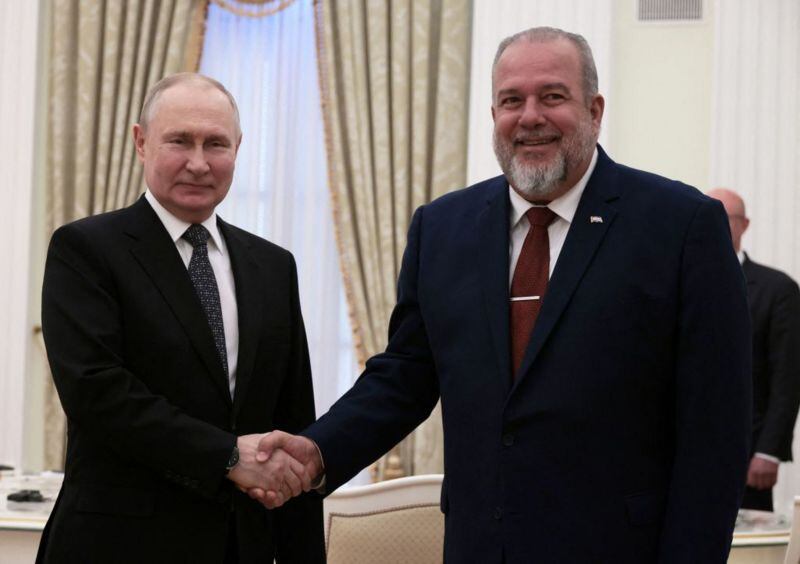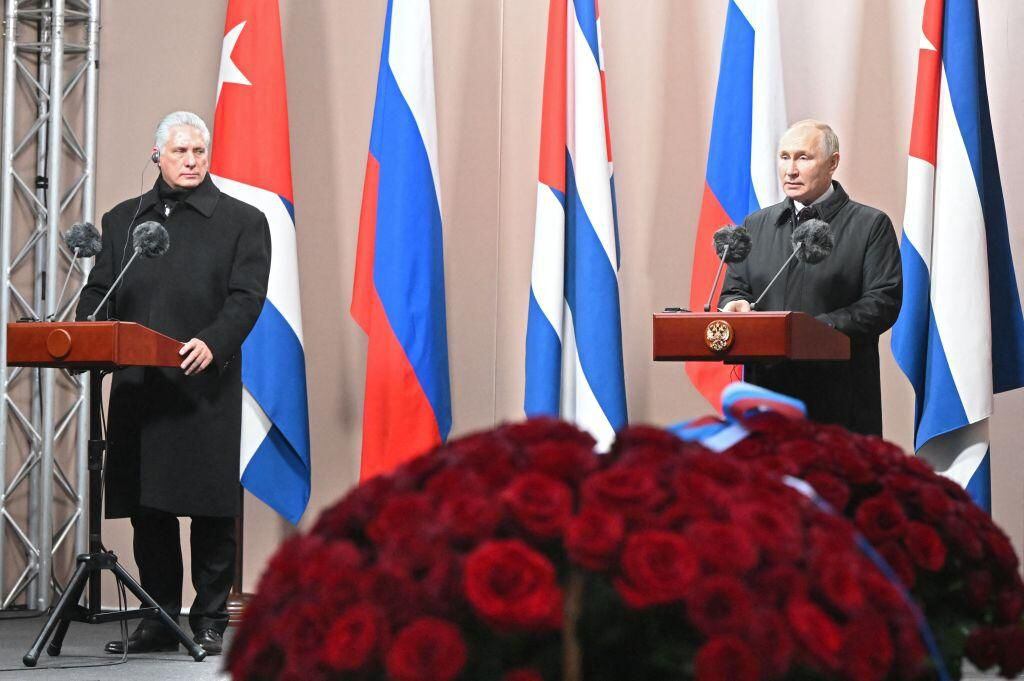Cuban citizens traveling to Russia and end up fighting Ukraine.
That is the complaint made this Monday by the Cuban government, which claimed to have dismantled a human trafficking gang that was dedicated to taking Cubans to Russia to recruit them as soldiers and thus participate in the war in Ukraine.
LOOK: “Currently, the risk of a nuclear detonation due to misinterpretations and miscalculations is very high”
“The Ministry of the Interior detected and is working on the neutralization and dismantling of a human trafficking network that operates from Russia to incorporate Cuban citizens living there, and even some from Cuba, into the military forces participating in war operations in Ukraine. ”, said the Cuban Ministry of Foreign Affairs.
The government indicated that it does not promote allowing or sponsoring Cuban citizens to participate in warlike actions within the conflict between Ukraine and Russia.
“Cuba is not part of the war in Ukraine. It is acting and will act energetically against anyone, from the national territory, who participates in any form of human trafficking for the purpose of recruitment or mercenarism for Cuban citizens to use arms against any country,” the document added.
The Cuban government’s statement responds to the case of several young Cubans who denounced on social networks that they were taken to Russia under deception to participate in the conflict.
The complaints, which were published in various local and international media, were related to videos made by the young Andorf Velázquez García and Alex Vegas Díaz.
Both young men denounced that they had been taken from Cuba to Russia with the promise of working as construction masons, but once there they were taken to the military recruitment zones.
“They made us sign some documents and they promised us a salary and food in exchange for a job, but the truth is that they are taking us to work in the war zone,” Velázquez told the América TeVe television network.
“We are in a city we don’t know, in a situation we don’t want to be in,” he added.
BBC Mundo contacted Mario Velázquez, Velázquez’s father and who lives in Mexico, but declined to comment.
So far there is no official data from the Russian government on the presence of Cuban soldiers in its army.
However, in the month of May it was learned that several Cubans residing in Russia had enrolled in the Russian army.
All as a result of the offer that the Moscow government had made to offer citizenship expeditiously to foreigners and their families who enroll in the army.
Because Russia does not require a tourist visa for Cubans to enter, there is a growing community in the country. In 2019, the entry of 28,000 Cubans was counted, although it is unknown how many of them remained permanently on Russian soil.
From masons to soldiers
Last May, the Russian news portal Ryazan Gazette reported that Cubans were joining the ranks fighting on Ukrainian territory.
According to what the Russian media reported, the Cubans were going to receive a single payment of about US$5,000 from the government of Moscow and the Ryazan province, where the soldiers were located.
Ryazan is located about 230 kilometers south of Moscow and several military bases operate there.
Earlier that month, the Russian president, Vladimir Putinhad issued a decree granting Russian citizenship expeditiously to foreigners who join Russia’s military campaign in Ukraine.
The presidential provision, published on the state legal information portal, states that in order to acquire Russian citizenship through the express procedure, foreigners will have to sign a contract for the provision of military service for one year.
But the revelations of these young people were the ones that became relevant in recent days, especially since they point out that they were taken to Russia with lies.
Velazquez pointed out that once they arrived in Russia, they underwent medical examinations to take them to the military regiment.
However, as Velázquez’s relatives said in different media, he was not finally recruited because he only has one kidney.
But other Cubans who accompanied Velázquez on the trip but did not reveal their identities said they had been duped out of a contract to remove rubble in war-torn Russian cities but ended up conscripted into the Russian army.
They also pointed out that there would be about 18 Cubans in the same situation.
Relatives of the young Cubans pointed out that two women, one of them a Russian national, convinced the young people to sign the contract – which was not written in Spanish – and then made them travel.
“The lady was never able to really explain the job and now my nephew doesn’t know what to do in a city where he doesn’t know anyone and where they don’t speak his language,” explained Mayein Leyva, Velázquez’s aunt.
“My son was deceived like many other young people who were sent by the government to a war,” Mario Velázquez said on August 26 on his Facebook page.
_______________________

An embarrassing situation for Havana
Analysis by Pascal Fletcher, BBC Monitoring in Miami
Although Moscow’s ally Cuba has made no secret of its political support for Russia in its war in Ukraine, the revelation that young Cubans have been signing contracts to serve in Russian military units in Ukraine is embarrassing for Havana.
Cuba’s government prefers to use the term “mercenaries” to condemn internal dissidents and anti-government activists it says are funded by the US government, so listening to Cuban exile media accuse Russia of Using Cubans as “mercenaries” and “cannon fodder” in Ukraine is anathema for the Cuban authorities.
This would explain the firmness of the statement from the Cuban Ministry of Foreign Affairs, denying that it had anything to do with an alleged plan to recruit Cubans operated from Russia.
However, beyond saying that it “detected” and that it “works to neutralize” what it called “a human trafficking network” that recruited Cubans to join Russian military units in Ukraine, the Cuban statement gave few details and left unanswered questions.
For example, many on social media wondered how the authorities of both countries were unaware of a scheme that involved signing formal contracts for services, including life insurance, in Russian, and groups of Cubans flying with their passports from the island to Russia.
It could also be uncomfortable for the Cuban authorities the admission by the young people, according to what was told to the Cuban media in exile, that they signed contracts to work in Russia because they needed the money to help their families, given the terrible current economic conditions in the country sanctioned by the United States.
They also mentioned that they were promised the possibility of possible residence in Russia, an attraction for many young Cubans desperately seeking to emigrate from the crisis-hit country.
Many will also remember that Cuba, in the course of its leftist Revolution, has a history of clandestine flights, shipments or deployments of fighters in support of allies around the world, such as in Ethiopia in the 1970s and in Angola in the 1970s and 1980s.
___________________________
Mercenaries fighting for Russia
But this is not the first known case of an attempt to recruit foreign mercenaries to help the Russian army in its campaign in Ukraine. There are also many foreign soldiers who are willingly fighting for Kyiv.
In addition to the well-known Wagner Group, which operates in Russia as a paramilitary force in some areas of Ukraine and in other parts of the world, the presence of units with soldiers from other countries has also been detected.

According to a report made by the BBC Russian Service, last year it became known that the Kremlin, through the Wagner Group, was recruiting Syrians to participate in the hostilities in Ukraine.
Dozens of people across Syria, which is ravaged by civil war, have expressed interest in joining the fighting, BBC Russia reported.
As the American Institute for the Study of War (ISW) reported in March 2022, the Kremlin announced its willingness to host “16,000 Middle Eastern fighters” in Ukraine.
Multiple Syrian media and social media users then claimed that Russian forces were identifying and recruiting Syrian fighters willing to fight in Ukraine on six-month contracts.
In June, the death of an Iraqi citizen who fought as part of the Wagner Group in the Ukraine was reported.
So far it is unknown if citizens of other Latin American countries have been recruited as mercenaries to be part of the Russian invasion of Ukraine.
In the diplomatic outpost in Latin America, Moscow has pointed to Cuba as “its great ally in the region.”
However, the government in Havana has been more cautious in its way of referring to Russia and, above all, in its position regarding the conflict with Ukraine. For example, in the various UN sessions where the issue was discussed, Cuba refrained from giving its position.
Source: Elcomercio
I am Jack Morton and I work in 24 News Recorder. I mostly cover world news and I have also authored 24 news recorder. I find this work highly interesting and it allows me to keep up with current events happening around the world.

:quality(75)/cloudfront-us-east-1.images.arcpublishing.com/elcomercio/5SJRYDFDCBBJHK2CUZFKS72RE4.jpg)


:quality(75)/cloudfront-us-east-1.images.arcpublishing.com/elcomercio/BUNML4TQNVHSBOBMY5FC3QEM2M.jpg)

:quality(75)/cloudfront-us-east-1.images.arcpublishing.com/elcomercio/FGNDNEX4V5AKXF6INLTN4FLZUQ.jpg)
